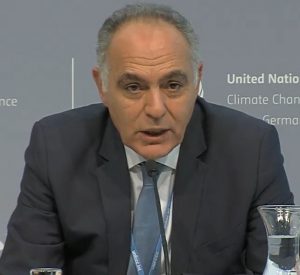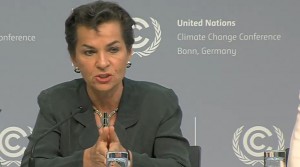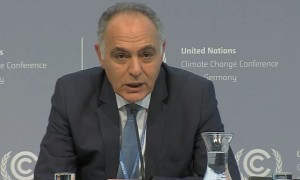Message To Media In Bonn: Brace For Accelerated Change As Paris “Rule Book” Takes Shape
The first major round of climate talks since the signing of the Paris Agreement have kicked off in Bonn, Germany, with the aim of developing the “rule book” that contains the nitty-gritty for implementing Nationally Determined Contributions (NDCs) to the climate challenge.

16 May 2016 | BONN | Germany | “The press used to ask me for many years: ‘Why is this going so slowly?’” said Christiana Figueres, Executive Secretary of the United Nations Framework Convention on Climate Change (UNFCCC), as she opened the latest round of climate-change negotiations – and the last before her term ends in the summer. “We’re now going to have to get ready for a new question from the press: ‘Why is it going so quickly?’”
The talks, which open today and run through May 26, are designed to begin the nitty-gritty task of designing a “Rule Book” for implementing the Paris Agreement, but many of those rules have already been laid out – especially those concerning land-use issues, which will be critical as industrial emissions decline.

Ségolène Royal and Salaheddine Mezouar, the co-presidents of the Conference to the Parties (COP) of the UNFCCC, both echoed Figueres’s optimism – a noticeable change from years past, when leadership seemed more intent on managing expectations than in raising them.
Alden Meyer, director of strategy and policy for the Union of Concerned Scientists, said the next two years would be a marked contrast to the last five, and he promised that the 2018 COP (COP 24) would be “a key moment where countries need to come to the table prepared to indicate how they can do more to increase ambition at the national level than they committed to in Paris.
Story continues below.
Why the Optimism?
Meyer laid out several reasons for optimism over the coming two years.
“With the continuing reductions in… and renewable energy prices, the mounting impacts of climate change, and the shifts in economies, there is no reason why every country shouldn’t be able to do more two or three years from now than they thought they could do last year,” he said.

Figueres agreed, but added one more.
“What has really changed the dynamic is the understanding of the many, many opportunities that come with addressing climate change,” she said. “It is this promising landscape of everything that can be done by countries to address climate change, but also – and most importantly – to further their national priorities and their national sustainable development targets that has actually changed the dynamic in the climate discussion.”
Developing Countries and Private Sector on the Agenda
The Paris Agreement aims to keep global average temperatures from rising 2 degrees Celsius this century and to aim for a limit of 1.5 degrees above pre-industrial levels, and Figueres, Royal, and Mezouar all stressed the importance of having developing countries present their targets for the first time, while Figueres emphasized the role of the private sector.
Please see our Reprint Guidelines for details on republishing our articles.

